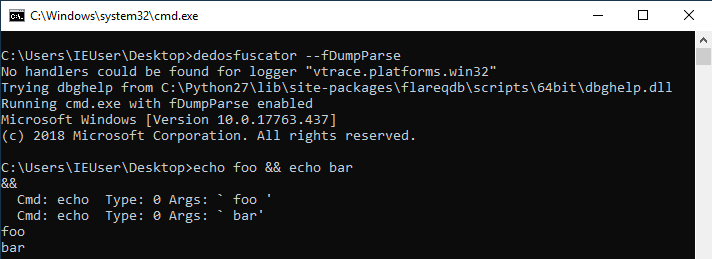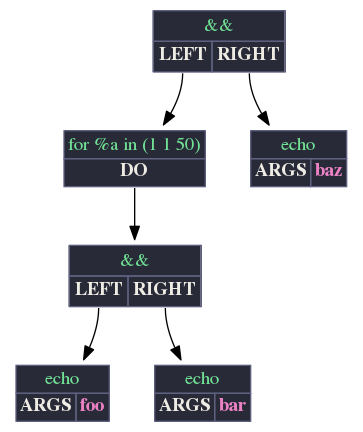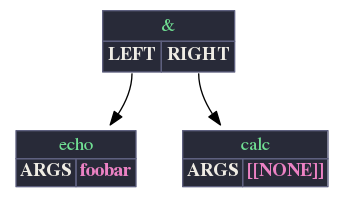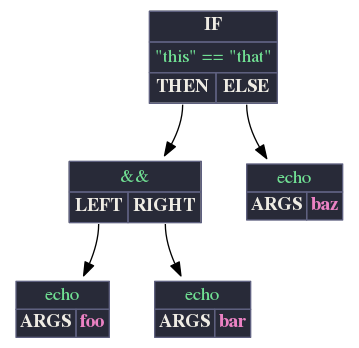In November 2018 FireEye released a report titled Cmd and Conquer: De-DOSfuscation with flare-qdb.
The report introduces a tool called De-Dosfuscator which helps solve the problem of analysing highly obfuscated CMD instructions by hooking CMD.EXE to extract commands “in the clear”.
Towards the end of the article, the author shares an easter egg they discovered while looking through the CMD.EXE disassembly. Buried within CMD.EXE is a flag named fDumpParse which can be used to dump an Abstract Syntax Tree (AST).

The above screenshot shows the AST output from De-Dosfuscator. Given the input expression:
echo foo && echo bar
De-Dosfuscator produces the AST:
&&
Cmd: echo Type: 0 Args: ` foo '
Cmd: echo Type: 0 Args: ` bar'
This is a textual representation of an AST in pre-order, sometimes called Polish Notation. We see the operator && at the top-level, with two equally indented Cmd: ... nodes below. Conceptually, this output represents a tree, with && at the root, and the two Cmd nodes forming left and right branches:
&&
/ \
Cmd1 Cmd2
As the author of the FireEye report points out, generating an AST from CMD in this format can be quite tricky to read, given the AST is not presented in the same order as the original command was entered. Furthermore, eyeballing the AST to make any sense of the input becomes almost impossible when the input command is large, as is often the case with obfuscated CMD sequences.
Given this hard-to-read limitation, I thought it may be interesting to convert the AST in to a graphical format to make it slightly easier to see what was going on.
Given the following input:
(for %a in (1 1 50) Do (echo foo && echo bar)) && echo baz
fDumpParse produces the AST:
&&
(
for %a in (1 1 50) Do
(
&&
Cmd: echo Type: 0 Args: ` foo '
Cmd: echo Type: 0 Args: ` bar'
Cmd: echo Type: 0 Args: ` baz'
…which I feed in to CMD-AST-View, which in turn produces a GraphViz drawing:

While it may not solve the problem of presenting a pre-order AST, CMD-AST-View does hopefully help make the AST easier to read. The GitHub project contains an F# library for parsing the fDumpParse output, and a command line utility that reads an AST from STDIN, and writes a GraphViz program to STDOUT, similar to:
cat example.ast | cmdast2dot | dot -Tpng -o example-ast.png
The F# library means the utility can be used on Mac, Linux, and Windows. Full usage and build instructions availalbe from the project’s README.md.

